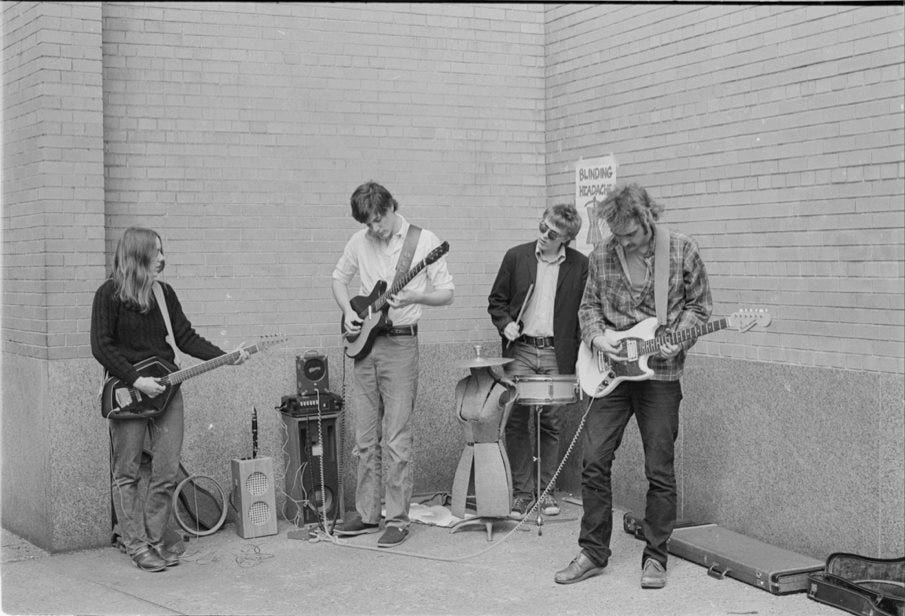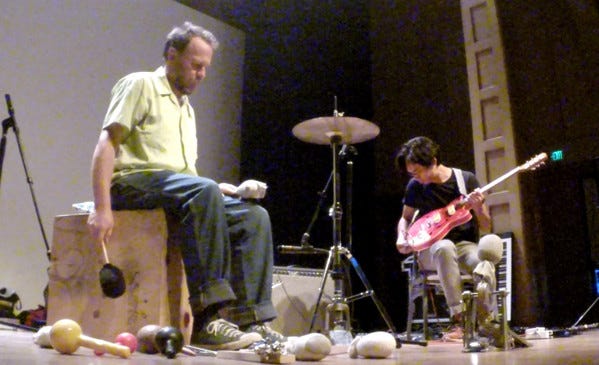Rick Brown Interview
from No Wave's Blinding Headache to today's 75 Dollar Bill
Rick Brown Interview on YouTube:
The bad news is, I couldn’t get this video to work on substack.
The good news is, it works on YouTube, AND I put chapter links on that video so you can jump right to the point your most interested it.
Rick Brown is well traveled in the sonic universe of the avant-garde. Upon arriving in NY from Delaware as a student at NYU, he quickly found his way into NY's burgeoning No Wave scene of the late 70's – first by co-founding the zine "Beat It!" with the now renowned No Wave photographer, Julia Gorton, which was followed by the forming of the bands Blinding Headache and Information. Both bands were formed by Rick and some like minded college friends during the height of No Wave's grip on the local punk scene. Blinding Headache opened for the band Mars at Irving Plaza, a gig recorded by Eno. Information opened for James White & The Blacks among others in addition to becoming regulars at Georgio Gomelsky's Zu Club. From here Rick forged a career that spans many decades, all without straying from that sonic pallet. Rick Brown may possibly be one of the longest running artist's you've never heard!
- Joshua Moore, author of the forthcoming book Theoretical Movement, a detailed reference guide of all No Wave/connected bands, spanning the years 1970-1985
Rick Brown’s long career in avant music is difficult to summarize — at least for me. So I asked No Wave researcher Joshua Moore to help me out with the above quote. I had just spent many hours editing my interview with Rick, and all of his stories were so interesting to me that there wasn’t much I wanted to chop out. How could I possibly summarize this man’s vast musical career? So thank you Josh. And btw, if you don’t belong to the No Wave facebook group that Josh helps to moderate, you should check it out.
The early part of Rick’s story is a familiar one for me, and maybe for you too. The love for music that developed throughout his high school years would draw him like a magnet away from his home and straight to a music mecca. That home for him was Delaware, and for me Arizona. My mecca was San Francisco, and his was obviously NYC.
At this point, the idea of becoming a musician was never on the table. But repeated exposure to the intense live music scene going on in both cities would, for each of us, eventually open the door to that new possibility. “I could do that.” Rick recalls a specific “trigger” moment he had at a Pere Ubu show. The trajectory of his life had just come to a major fork in the road. Goodbye NYU, hello No Wave.
Rick’s playing days would begin in the basement of his dormitory banging on the boiler with his two guitar playing friends. They soon graduated to the street, where he was now playing a very scaled down drum set cobbled together from donations, including a dress makers dummy as a cymbal stand. These street performances got the attention of what we would now call the “established” No Wave artists, and Rick’s band Blinding Headache was soon invited to open gigs for them. One of these would be for the band Mars at Irving Plaza, recorded by Brian Eno. Unfortunately for Rick and the band, Eno was only interested in recording Mars that night.
Looking for more opportunities to play live, Rick and his mates saw some flyers about an upcoming festival. One look at the list of bands and they thought “we should play at this”. They got the phone number of festival producer Giorgio Gomelsky and gave him a call. “Oh, Blinding Headache, I’ve been looking for you.” Today you can hear that, and many other performances from the 1978 Zu Manifestival at the Giorgio Gomelsky tribute website. An interesting side note is that Rick lived around the corner from the theatre that was the venue for the Zu Fest, and he still lives there today.
Giorgio also did gigs at his 3 story industrial loft space. Rick had moved on from Blinding Headache, to the band Information, and they would play several gigs at Giorgio’s place. One very memorable experience for Rick was being invited by Giorgio to open for Nico for some shows at the loft. Unfortunately Nico was unable to play at the first couple of shows, and Giorgio had to explain to Rick’s band why she would get their money for the gig.
In these first few years of artistic exploration for Rick, there would be two women that made a significant impact on his development. The first was his high school girlfriend, Julia Gorton, who joined Rick in NYC about a year after he arrived there. The two of them started a “zine” and Julia began photographing the scene as it was happening around them. Today her photographs are very highly regarded and she has recently assembled them in a beautiful 192 page book called NOWHERE NEW YORK.
The second woman was bass player Ann Rupel. Rick, Ann, and David Zonzinsky on sax, formed the band V-Effect. He credits Ann with “kicking his ass, in a good way” musically, and the band got the attention of Fred Frith who invited them to tour Europe with his band Skeleton Crew. Fred would also help them record their album Stop Those Songs.
Rick never played a traditional drum set, and as his musical explorations moved along he would always be looking for new experiences and new opportunities to improve his playing. One day he found a large crate on the street and took it home thinking he might be able to do something with it. I’ve seen people play crate-type drums before, but Rick would school me on the long tradition of the “cajon” in Latin-American folk music. But his new found crate would sit on a shelf for some time, waiting for the right opportunity.
It finally happened when Rick met microtonal electric guitar player Che Chen. The crate came off the shelf, and the band 75 Dollar Bill was formed. They’ve been playing together for over 10 years now with the duo often expanding with like minded friends joining in. They’ve even performed as a marching band. Most recently, they’ve been recording in the studio of Tony Maimone, the bass player for Pere Ubu over 40 years ago when Rick had his “trigger” realization that he could become a musician.
75 Dollar Bill is one of the essential groups at the heart of NYC's underground. Driven by the telepathic union of Che Chen's microtonal electric guitar and Rick Brown's odd metered percussion their long-form sound is unmistakable and compelling. On their third album I WAS REAL, the group expands in bold new directions, embracing brilliant fuller orchestrations, joyous rockers and entrancing new textures. I WAS REAL is a monumental signature work capturing the group at the peak of their powers.
- from their label Thin Wrist / Black Editions
Please find some time to enjoy this wonderful conversation I had with Rick Brown. And make sure to check out his music, both past and present, on Bandcamp.



